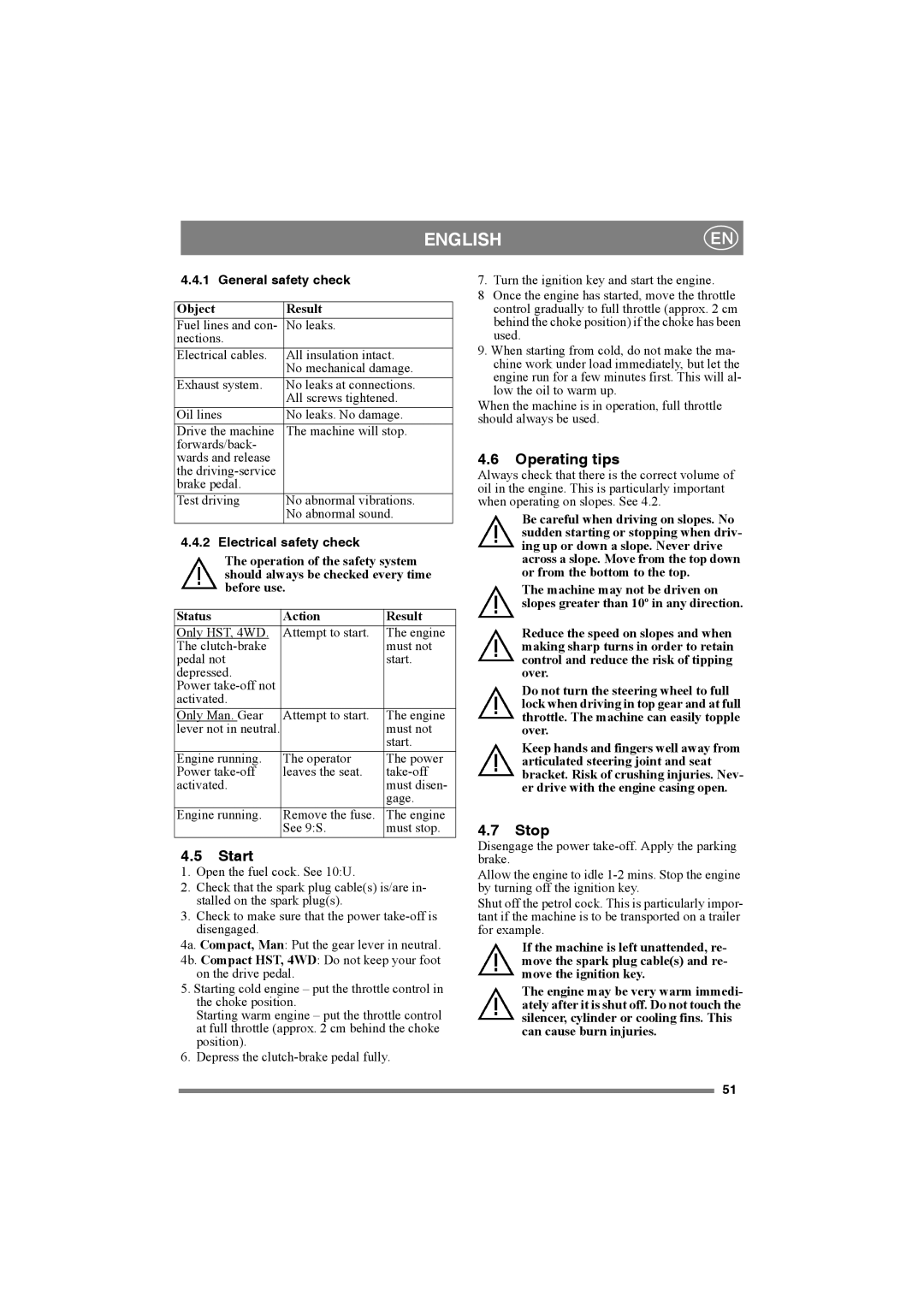
ENGLISH
4.4.1 General safety check
Object | Result |
Fuel lines and con- | No leaks. |
nections. |
|
Electrical cables. | All insulation intact. |
| No mechanical damage. |
Exhaust system. | No leaks at connections. |
| All screws tightened. |
Oil lines | No leaks. No damage. |
Drive the machine | The machine will stop. |
forwards/back- |
|
wards and release |
|
the |
|
brake pedal. |
|
Test driving | No abnormal vibrations. |
| No abnormal sound. |
4.4.2 Electrical safety check
The operation of the safety system should always be checked every time before use.
Status | Action | Result |
Only HST, 4WD. | Attempt to start. | The engine |
The |
| must not |
pedal not |
| start. |
depressed. |
|
|
Power |
|
|
activated. |
|
|
Only Man. Gear | Attempt to start. | The engine |
lever not in neutral. |
| must not |
|
| start. |
Engine running. | The operator | The power |
Power | leaves the seat. | |
activated. |
| must disen- |
|
| gage. |
Engine running. | Remove the fuse. | The engine |
| See 9:S. | must stop. |
4.5Start
1.Open the fuel cock. See 10:U.
2.Check that the spark plug cable(s) is/are in- stalled on the spark plug(s).
3.Check to make sure that the power
4a. Compact, Man: Put the gear lever in neutral.
4b. Compact HST, 4WD: Do not keep your foot on the drive pedal.
5.Starting cold engine – put the throttle control in the choke position.
Starting warm engine – put the throttle control at full throttle (approx. 2 cm behind the choke position).
6.Depress the
7. Turn the ignition key and start the engine.
8Once the engine has started, move the throttle control gradually to full throttle (approx. 2 cm behind the choke position) if the choke has been used.
9.When starting from cold, do not make the ma- chine work under load immediately, but let the engine run for a few minutes first. This will al- low the oil to warm up.
When the machine is in operation, full throttle should always be used.
4.6Operating tips
Always check that there is the correct volume of oil in the engine. This is particularly important when operating on slopes. See 4.2.
Be careful when driving on slopes. No sudden starting or stopping when driv- ing up or down a slope. Never drive across a slope. Move from the top down or from the bottom to the top.
The machine may not be driven on slopes greater than 10º in any direction.
Reduce the speed on slopes and when making sharp turns in order to retain control and reduce the risk of tipping over.
Do not turn the steering wheel to full lock when driving in top gear and at full throttle. The machine can easily topple over.
Keep hands and fingers well away from articulated steering joint and seat bracket. Risk of crushing injuries. Nev- er drive with the engine casing open.
4.7Stop
Disengage the power
Allow the engine to idle
Shut off the petrol cock. This is particularly impor- tant if the machine is to be transported on a trailer for example.
If the machine is left unattended, re- move the spark plug cable(s) and re- move the ignition key.
The engine may be very warm immedi- ately after it is shut off. Do not touch the silencer, cylinder or cooling fins. This can cause burn injuries.
51
